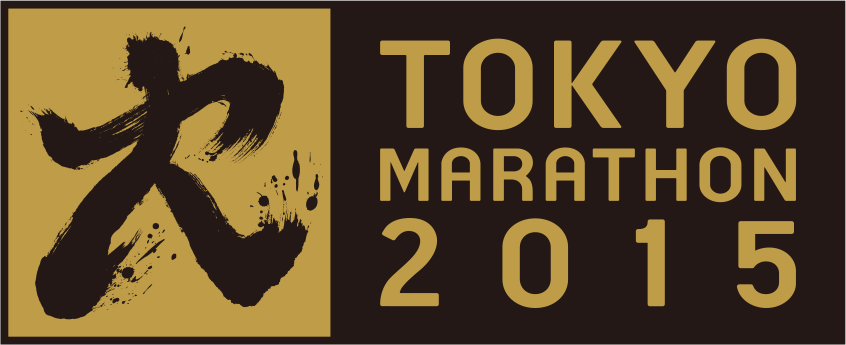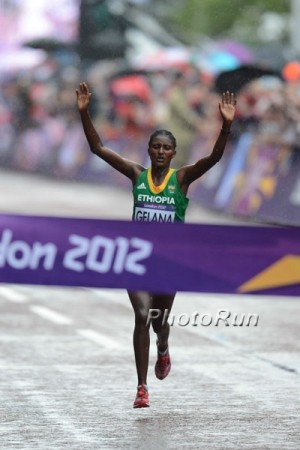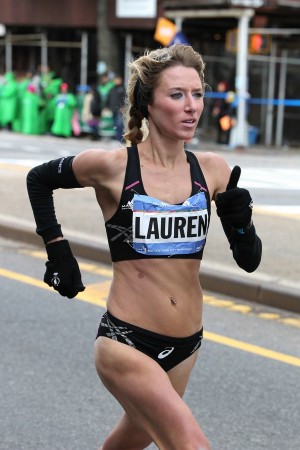Women’s Preview: Can Olympic Champ Tiki Gelana Resurrect Her Career?
By Jonathan Gault
February 20, 2015
Earlier today, LRC posted its 2015 Tokyo Marathon men’s preview. Now it’s time to take a look at the women’s race.
There’s no way to sugarcoat it: this isn’t a strong field. The Tokyo media guide lists just 10 women in the elite field compared to 22 on the men’s side. Don’t believe us? Here’s what Japan Running News Brett Larner wrote about the field:
Looking at the history and structure of the Tokyo marathon it’s not much of a secret that its women’s field is only there to meet the minimum necessary requirements for international accolades like an IAAF gold label and World Marathon Major membership.
The biggest name is Olympic champ Tiki Gelana of Ethiopia, but she hasn’t run a good race since claiming gold in London. 2014 runner-up Birhane Dibaba (2:22:30 pb) returns and 2014 Paris/Commonwealth champ Flomena Cheyech Daniel of Kenya (2:22:44) should provide some competition.
Read on for the details on Sunday’s races and a breakdown of the top women’s contenders.
What: 2015 Tokyo Marathon
When: Sunday, 9:10 a.m. Japan Standard Time (7:10 p.m. Saturday night ET)
Where: Tokyo, Japan
How to watch: Live on Universal Sports TV Network or online at UniversalSports.com starting at 7 p.m. ET.
Prize money
Unlike most major marathons, Tokyo has nothing about prize money on its website. All it says is “for the marathon race, prize money based on the results will be awarded in accordance with separate rules.“
Abbott World Marathon Majors
Since its inception in 2006, the World Marathon Majors crowned champions in two-year cycles, with the male and female winner each taking home $500,000. Yesterday, organizers announced that, while the $500,000 prizes will remain the same, the format will change to a one-year cycle. The WMM races remain the same (Tokyo, Boston, London, Berlin, Chicago and New York plus the World Championship/Olympic marathons).
Here’s how the new system works.
Each cycle will begin and end with the same race. So the first cycle under the new format — known as AWMM Series IX — will begin with the 2015 Tokyo Marathon on Sunday and conclude with the 2016 Tokyo Marathon. AWMM Series X will begin with the 2016 Boston Marathon (the next race on the calendar after Tokyo) and conclude with the 2017 Boston Marathon, and so on.
The points system has also been tweaked. Instead of 25-15-10-5-1 for 1st through 5th, the new system is 25-16-9-4-1. So 2nds are slightly more valuable, 3rds and 4ths are slightly less valuable and 1sts and 5ths remain the same. Additionally, runners can only score points in a maximum of two races per cycle, so the most points anyone can finish with is 50. If two runners are tied atop the standings, the first tiebreaker is head-to-head record in WMM races and the second tiebreaker is total victories. The third tiebreaker comes down to which athlete the WMM race directors determine to be the champion, though they also have the right to award the title jointly (that seems like the only fair thing to do if there’s a scenario where one runner wins Boston and New York and another wins London and Chicago).
Finally, the WMM announced beefed-up drug testing will go into effect from this point forward and that, in cooperation with the IAAF, it will “create a pool of championship-eligible runners who will undergo additional out-of-competition drug testing” with full details to be announced later. The $500,000 prize will also be awarded over the course of five years, $100,000 at a time “to take advantage of long-term biological mapping of athletes.” In the past, the prize was awarded in a lump sum. Clearly, the WMM doesn’t want another doper like Liliya Shobukhova or Rita Jeptoo stealing money from a clean athlete.
| Athlete | Country | PB | Comment |
| Tiki Gelana | Ethiopia | 2:18:58 | Olympic champ has struggled in last 4 marathons: 1 DNF & fastest time of 2:26:58 |
| Birhane Dibaba | Ethiopia | 2:22:30 | Last year’s runner-up was 4th in Chicago in October; still just 21 years old |
| Flomena Cheyech Daniel | Kenya | 2:22:44 | 2014 Paris/Commonwealth champion makes WMM debut |
| Albina Mayorova | Russia | 2:23:52 | 6th last year & 4th in ’13; 2:49 for 4th in Singapore in December |
| Yeshi Esayias | Ethiopia | 2:24:06 | Runner-up in ’12 & ’13 was 12th in Boston last year, then 5th in Beijing in October |
| Helah Kiprop | Kenya | 2:26:27 | 2014 Seoul champ’s pb dates back to 2007 |
| Lauren Kleppin | USA | 2:28:48 | Lone American woman placed 12th at US Half Champs in January (1:12:31) |
| Azusa Nojiri | Japan | 2:24:57 | 11th last year; will have just 27 days of rest after running Osaka on Jan. 25 (2:42:16) |
| Madoki Ogi | Japan | 2:26:55 | Ran 1:14:11 at Marugame Half Marathon on February 1 |
| Selly Kaptich Chepyego | Kenya | debut | Won Osaka Half Marathon in 69:45 on Jan. 25; 3rd at World Half Champs in ’14 (67:51 half pb) |
The Favorites
Birhane Dibaba — Ethiopia, 21 years old, 2:22:30 pb (2014 Tokyo), 69:34 half
Last two marathons: 4th 2014 Chicago (2:27:02), 2nd 2014 Tokyo (2:22:30)
Dibaba isn’t related to track studs Genzebe and Tirunesh, but, at just 21 years old, she’s got a bright future herself. Dibaba has improved in each of her three years as a marathoner (she had already ran two marathons by age 19) and will look to continue that trend in 2015. Last year, she finished second and fourth in her first two majors, PR’ing by over 30 seconds in Tokyo. Now she’ll look for major victory #1, a feat that is very attainable in Tokyo.
Gelana is the only woman in the field who has run faster than Dibaba, but that time is from 2012; Gelana hasn’t been the same since her Olympic win (my bosses might say since getting slammed by wheelchair in London 2013). Dibaba still has plenty of time to chase a major victory, but with just eight other women in the elite field, she isn’t going to get many better chances than this.
Flomena Cheyech Daniel — Kenya, 32 years old, 2:22:44 pb (2014 Paris), 67:39 half
Last two marathons: 1st 2014 Commonwealth Games (2:26:45), 1st 2014 Paris (2:22:44)
Daniel didn’t turn to the marathon full-time until December 2012, but since that time, she’s been almost unbeatable. After taking second at the Singapore Marathon in December 2012 in 2:37:57, she won her next four marathons (2013 Vienna, 2013 Toronto, 2014 Paris, 2014 Commonwealths). She’ll look to extend that winning streak to five in her first career major in Tokyo.
In many ways, Daniel and Dibaba are similar. Both have improved each year after moving to the marathon in 2012 and their pbs are separated by just 14 seconds. Ironically, it’s the 21-year-old Dibaba who is more experienced, as she’s run seven marathons, including two majors compared to six marathons (no majors) for Daniel.
If you’re going by past achievements, Gelana has the first-, second- and third-most impressive performances on her resume (2:23:07 to win 2012 Olympics; 2:18:58 to win 2012 Rotterdam; 2:22:08 to win 2011 Amsterdam), but none of those performances have come in the past two years. Dibaba and Daniel enter in the best form of anyone and it’s likely that one of them comes away with her first major victory Sunday morning.
The Olympic Champ
Tiki Gelana — Ethiopia, 27 years old, 2:18:58 pb (2012 Rotterdam), 67:48 half
Last two marathons: 6th 2014 Yokohama (2:29:13), 9th 2014 London (2:26:58)
At the end of 2012, Gelana looked set to dominate the marathon for the next five years. In April, she had run 2:18:58 in Rotterdam to become the third-fastest marathoner of all time (Mary Keitany bumped her back to #4 after running 2:18:37 a week later). Four months later, she beat Keitany — and everyone else — to win Olympic gold in London. At just 25 years old, her future was bright.
The next two years have been anything but smooth. Though she started 2013 well, winning the Marugame Half Marathon in 68:53, Gelana was knocked to the ground in her first post-Olympic marathon, in London, after colliding with a wheelchair racer at the 15k mark. She never recovered, fading to 16th place in 2:36:55. She couldn’t even make it four miles in her next marathon, at the 2013 World Championships in Moscow, dropping out early due to the humidity.
Last year went better — she managed to stay on her feet and finish both her marathons — but her performances remained disappointing. She ran just 2:26:58 for ninth in London in April and followed that up with an even worse 2:29:13 for sixth in Yokohama in November. You could chalk 2013 up to bad luck; 2014 was worrying, because it’s now been 30 months since Gelana ran a good marathon. At 27, Gelana still has time to revive her career — one of Rojo’s favorite phrases is “talent doesn’t go away” — but if she runs poorly again in Tokyo, it’s fair to wonder whether we’ll ever see the Gelana of 2012 again.
They’ve Run Well Here Before
Albina Mayorova — Russia, 37 years old, 2:23:52 pb (2012 Nagoya), 70:57 half
Last two marathons: 4th 2014 Singapore (2:49:26), 17th 2014 European Championships (2:33:45)
Japan has been kind to Mayorova. Four of her six career marathon victories have come in the Land of the Rising Sun and she set her pb here at the 2012 Nagoya Marathon. Though she’s now 37, Mayorova has run well in Tokyo the past two years (sixth last year, fourth in 2013) and has a shot to do so again in 2015.
Of course, with such a shallow women’s field, what constitutes a “good” performance is subjective. Normally, a top-five finish at a World Marathon Major is something most runners would be happy with. But if there are only 10 elite women in the field — as there are in Tokyo — finishing fifth starts to look average. Factor in that at least one or two of those women will DNF or have an off day, and fifth could be viewed as disappointing. So Mayorova is a threat to finish in the top five, but whether that performance rates as impressive depends on how the race goes.
Yeshi Esayias — Ethiopia, 29 years old, 2:24:06 pb (2013 Frankfurt), 72:59 half
Last two marathons: 5th 2014 Beijing (2:38:36), 12th 2014 Boston (2:27:40)
Esayias finished second in this race in 2012 and 2013, though she didn’t run Tokyo in 2014 and was just 12th in Boston before placing fifth in Beijing in 2:38:36, her slowest marathon since 2007. Her experience on the course make her a threat to run well here but her upside is limited.
The American
Lauren Kleppin — USA, 26 years old, 2:28:48 pb (2014 Los Angeles), 70:15 half
Last two marathons: 15th 2014 New York (2:39:13), 3rd 2014 Los Angeles (2:28:48)
Kleppin announced herself as a dark horse contender for the 2016 Olympic team with her 2:28:48 in LA last year — her first serious marathon. That time put her fourth on the U.S. list in 2014 (though LA is not a record-eligible course) and though she was just the fourth American in New York last fall (15th overall), the Western State grad remains a relative novice in the event and has room for improvement.
Kleppin was 12th at last month’s USA Half Marathon Championships in Houston, running 72:31. That’s not an awful performance (it’s just 19 seconds slower than she ran in ’14), but she also finished 10 places lower than she did the year before. She won’t mind that result if she can put together a PR in Tokyo. Though the conditions don’t seem to be setting up for a fast time, if Kleppin can approach her PR or finish in the top four on Sunday, she’ll have to return to the U.S. satisfied.
The Debutante
Selly Kaptich Chepyego — Kenya, 29 years old, 67:51 half
No, this isn’t former Texas Tech star Sally Kipyego, it’s 2014 World Half Marathon Championships bronze medalist Selly Chepyego. Chepyego has a promising background both in the half marathon and the 10,000 (seventh at Worlds in 2013) and enters this race on the strength of a 69:43 half marathon win in Osaka on January 25. If you’re looking for a surprise winner on Sunday, Chepyego is your woman (though would it really be a surprise for a 67:51 woman to win this race?). The circumstances are perfectly set up for Chepyego to win her debut marathon: she’s in good form (apart from the World Half Champs, she hasn’t lost a race since September 2013), she’s racing on “home soil” (she’s based in Japan) and the field in Tokyo isn’t as tough as most major marathons. Her background suggests that Chepyego should make a solid marathoner, so don’t be surprised if the marathon rookie schools the veterans on Sunday.
Course and weather details
The course, which features two out-and-back sections, drops just over 100 feet over the first couple miles but is incredibly flat the rest of the way. You can view the course map here; the course record is 2:22:23, set last year by Tirfi Tsegaye. The race will feature rabbits.
Weather-wise, the high in Tokyo on Saturday is forecast to be 59 degrees, and Weather.com predicts that there is a 50% chance of rain (all information as of Friday afternoon ET). It’s also supposed to get quite windy in the afternoon (25-35 mph), though the wind will be slightly better during the race in the morning (10-15 mph). It could be worse, but this does not appear to be good weather for running fast.





